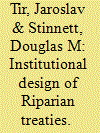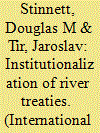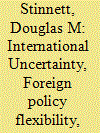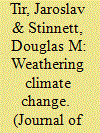|
|
|
Sort Order |
|
|
|
Items / Page
|
|
|
|
|
|
|
| Srl | Item |
| 1 |
ID:
106357


|
|
|
|
|
| Publication |
2011.
|
| Summary/Abstract |
The adoption of UN Security Council Resolution (UNSCR) 1540 in 2004 reflects an emerging consensus that more should be done by the international community to address the proliferation of weapons of mass destruction. UNSCR 1540 articulates a universal, legally binding obligation for all states to confront proliferation by adopting effective export control systems. To date, however, there have been no attempts to systematically analyze compliance with this new obligation, making it impossible to assess the success of this measure and the underlying causes of any shortcomings. This study addresses this by conducting a systematic empirical analysis of state compliance with UNSCR 1540. Drawing upon theories of compliance with international law, we investigate two distinct explanations for variation in the degree to which states adopt nonproliferation export controls: one based on state interests and enforcement and the other based on state capacity. Our statistical tests of these theories use a new, cross-national data set detailing the nonproliferation policies of 30 states. The empirical results indicate that compliance with international nonproliferation obligations is influenced most by a state's economic and governmental capacities and has little to do with interest-based factors. These findings suggest that capacity-building programs are the best option for improving the implementation of UNSCR 1540 and of nonproliferation efforts in general.
|
|
|
|
|
|
|
|
|
|
|
|
|
|
|
|
| 2 |
ID:
107925


|
|
|
|
|
| Publication |
2011.
|
| Summary/Abstract |
International agreements governing rivers vary considerably in whether they contain institutional provisions for joint monitoring, conflict resolution, enforcement, and/or the delegation of authority to intergovernmental organizations. This article develops an explanation for why some river management treaties include more institutional provisions while others contain fewer, if any. The authors argue that certain types of issues related to river use-water quantity, water quality, and navigation-tend to be difficult to manage and prone to noncompliance. When forming treaties to address these specific issues, states will be more likely to include institutional provisions. The authors test the link between these river use issues and institutional design using a data set of 315 river treaties signed since 1950. The results show that highly contentious issues-and in particular water quantity and navigation-have a greater effect on the institutional design of river treaties than contextual and power politics factors.
|
|
|
|
|
|
|
|
|
|
|
|
|
|
|
|
| 3 |
ID:
088928


|
|
|
|
|
| Publication |
2009.
|
| Summary/Abstract |
This article seeks to expand our understanding of why states use international institutions to manage transboundary rivers. Agreements governing the use and management of international rivers can contain a variety of different institutional features. We address the question of why riparian states choose to include or exclude these features from river treaties. Our explanation focuses on the problem of securing post-agreement compliance. Institutions perform a variety of functions that help states maintain cooperation over time. We analyze this explanation using a data set of river treaties formed between 1950 and 2002. We find that the institutionalization of river treaties is associated with water scarcity, the flow pattern of shared rivers, trade interdependence, and the level of economic development. These findings have important implications for the possibility that rivers will be a source of future conflicts.
|
|
|
|
|
|
|
|
|
|
|
|
|
|
|
|
| 4 |
ID:
077424


|
|
|
|
|
| Publication |
2007.
|
| Summary/Abstract |
This article explains the prevalence of surplus majority government coalitions in Israel as a result of the interaction between international uncertainty and the need to preserve both government stability and latitude in the conduct of foreign policy. I develop a game-theoretic model of government formation in which the international environment is a source of uncertainty for the policy preferences of the prime minister. The model predicts that when uncertainty is high enough, it is optimal for the prime minister to establish an oversized coalition government. By including expendable parties in a government, the prime minister has greater freedom to modify foreign policy in response to the international environment without jeopardizing majority status in parliament. The logic of the model is analyzed through two case studies: Menachem Begin, 1977-1981, and Ehud Barak, 1999-2000. The findings of the model have larger theoretical implications for the connection between domestic politics and international relations
|
|
|
|
|
|
|
|
|
|
|
|
|
|
|
|
| 5 |
ID:
110815


|
|
|
|
|
| Publication |
2012.
|
| Summary/Abstract |
Although the subject remains contested, some have speculated that climate change could jeopardize international security. Climate change is likely to alter the runoff of many rivers due to changes in precipitation patterns. At the same time, climate change will likely increase the demand for river water, due to more frequent droughts and greater stress being placed on other sources of water. The resulting strain on transboundary rivers could contribute to international tensions and increase the risk of military conflict. This study nevertheless notes that the propensity for conflicts over water to escalate depends on whether the river in question is governed by a formal agreement. More specifically, the article argues that the ability of river treaties to adapt to the increase in water stress resulting from climate change will depend on their institutional design. It focuses on four specific institutional features: provisions for joint monitoring, conflict resolution, treaty enforcement, and the delegation of authority to intergovernmental organizations. Treaties that contain more of these features are expected to better manage conflicts caused by water stress. This expectation is tested by analyzing historical data on water availability and the occurrence of militarized conflict between signatories of river treaties, 1950-2000. The empirical results reveal that water scarcity does increase the risk of military conflict, but that this risk is offset by institutionalized agreements. These results provide evidence, albeit indirect, that the presence of international institutions can be an important means of adapting to the security consequences of climate change by playing an intervening role between climate change and international conflict.
|
|
|
|
|
|
|
|
|
|
|
|
|
|
|
|
|
|
|
|
|